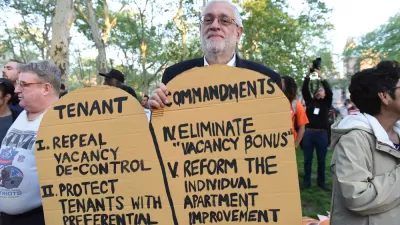A June 7 ballot measure in Richmond, California would permit 59 single family homes to be built on a 5-acre bayfront lot within walking distance to a future ferry landing for San Francisco service. The site is zoned for high-density housing.

Developer and landowner Richard Poe, founder of Virtual Development Corporation, opposes building high-density apartments on his property, so he has qualified an initiative, "Riveria Project" (Measure N) to get voter approval on Tuesday to permit the low density project to bypass Richmond's general plan.
The measure "is the focus of a fierce political battle over how much housing will get built in the East Bay city" of 107,000, writes Rachel Swan, who covers Oakland and the surrounding East Bay cities for the San Francisco Chronicle. Richmond is in Contra Costa County.
Poe’s Measure N would loosen the city’s general plan that calls for high-density apartments and office buildings near transit corridors so that his project could sail through.
The Richmond ferry terminal, to be built by the San Francisco Bay Area Water Emergency Transportation Authority (WETA), is scheduled to open in 2018. The limited service to and from San Francisco, approved by WETA in March 2015, will be subsidized by the Contra Costa Transportation Authority (CCTA) and the City of Richmond.
“The development he’s proposed is totally inappropriate,” said Mayor Tom Butt, who has donated $2,500 to defeat Measure N. “It’s basically a suburban, almost rural project in an area that should be focused on high-intensity building.”
"The measure calls for altering the city's general plan — a document that took years of work and reflects the input of thousands of Richmond residents — to suit Poe's desires," wrote John Geluardi for the East Bay Express on Nov. 11, 2015 when Poe announced his intention to bypass the city approval process and gather signatures.
For decades, large, dense developments have bypassed Richmond, while cities like San Francisco, Oakland, Emeryville, and Berkeley have undergone revenue-generating building booms. That's why the Richmond general plan designated Poe's five-acre site as "high intensity mixed use" and zoned the site for structures of up to 135 feet and residential density of up to 625 units. But Poe wants to build 59 expensive, single-family homes with a maximum height of 35 feet.
Poe's activism didn't stop with Measure N. He also qualified Measure O for Tuesday's ballot which would limit the pay of the city manager. Mayor Butt opined in The Richmond Standard that the measure was done as an act of "collateral spite towards City staff who did not embrace his project."
Also on the June 7 ballot in the Bay Area is the first 9-county regional measure, AA, that calls for an annual $12 parcel tax for wetland restoration that would also mitigate coastal flooding and sea level rise.
Correspondent's notes: The Chronicle article may not be accessible without subscription. Please click on East Bay Express and The Richmond Standard for more information on the two measures.
In addition to above links to Ballotpedia, see the city of Richmond webpage for June 7 ballot measures and potential Nov. 8 ballot measures.
FULL STORY: Richmond fights for apartments; developer wants ‘Riviera’ homes

Maui's Vacation Rental Debate Turns Ugly
Verbal attacks, misinformation campaigns and fistfights plague a high-stakes debate to convert thousands of vacation rentals into long-term housing.

Planetizen Federal Action Tracker
A weekly monitor of how Trump’s orders and actions are impacting planners and planning in America.

In Urban Planning, AI Prompting Could be the New Design Thinking
Creativity has long been key to great urban design. What if we see AI as our new creative partner?

King County Supportive Housing Program Offers Hope for Unhoused Residents
The county is taking a ‘Housing First’ approach that prioritizes getting people into housing, then offering wraparound supportive services.

Researchers Use AI to Get Clearer Picture of US Housing
Analysts are using artificial intelligence to supercharge their research by allowing them to comb through data faster. Though these AI tools can be error prone, they save time and housing researchers are optimistic about the future.

Making Shared Micromobility More Inclusive
Cities and shared mobility system operators can do more to include people with disabilities in planning and operations, per a new report.
Urban Design for Planners 1: Software Tools
This six-course series explores essential urban design concepts using open source software and equips planners with the tools they need to participate fully in the urban design process.
Planning for Universal Design
Learn the tools for implementing Universal Design in planning regulations.
planning NEXT
Appalachian Highlands Housing Partners
Mpact (founded as Rail~Volution)
City of Camden Redevelopment Agency
City of Astoria
City of Portland
City of Laramie





























